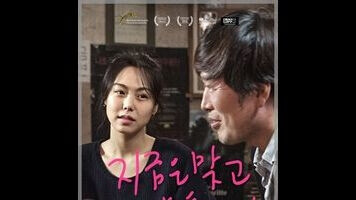A few decades ago, Korean filmmaker Hong Sang-soo might have had the same degree of commercial success in America that, say, Éric Rohmer once did. Hong’s movies—he’s directed 17 features since 1996, all but the first of which he also wrote—are a lot like Rohmer’s, crafting minute variations on the intersection of art and romance from a very basic template. (Both directors have been accused, with some justification, of making the same film over and over again.) Unlike Rohmer, however, who had many crossover hits over the course of his lengthy career, Hong has yet to make more than a tiny dent at the U.S. box office. His top-grossing movie here, In Another Country (2012), brought in a piddling $25,000, and that was with Isabelle Huppert in the lead role. The arthouse market is no longer hospitable to a low-key miniaturist like Hong. That’s a real shame, because his latest effort, Right Now, Wrong Then—which won the top prize at 2015’s Locarno Film Festival, and is heroically being released by brand-new distributor Grasshopper Film—is not only his finest work to date but also the very best film released in 2016 so far.
Like several of Hong’s films, Right Now, Wrong Then tells a story, then abruptly restarts and tells the story again, but with a difference. Cheon-soo (Jeong Jae-yeong), a celebrated film director, has just arrived in Suwon, 19 miles south of Seoul, for a Q&A session following a screening of one of his films. (The preponderance of directors among Hong’s protagonists contributes heavily to the déjà vu issue.) Visiting an 18th-century palace during his downtime, Cheon-soo meets Hee-jeong (Kim Min-hee, who also stars in Park Chan-wook’s forthcoming The Handmaiden), an aspiring painter and ardent fan of his work. They go for coffee together, visit her studio, grab some dinner, then stop by a dinner party hosted by her friends. The evening ends somewhat badly… at which point (about an hour in) the whole narrative replays from the beginning, with entire scenes repeated almost verbatim. But slight divergences soon lead to one big divergence, after which events are superficially similar yet dramatically altered.
While this sort of doubling is commonplace in Hong’s films, it usually isn’t quite so literal. Turning Gate (2002), for example, has the same structure, but doesn’t actually repeat anything—the hero just applies what he learns from a fling with a woman in the film’s first half to his relationship with another woman in its second half. Virgin Stripped Bare By Her Bachelors (2000) does feature repeated scenes but with oddly meaningless variations—someone, say, drops a spoon instead of a fork, to no apparent effect. Here, by contrast, the divide is both inexplicable and stark, its fulcrum the scene at Hee-jeong’s studio. In the first half, when Hee-jeong asks Cheon-soo for his opinion of her paintings, he gushes nervous praise; in the second half, his response is critical almost to the point of being downright rude. What follows in each case slyly suggests that disarming honesty and candor will succeed where deceitful manipulation fails, but the film does so without a hint of moralism. Nor is it as tidy as that might sound—not everything fits the right-wrong dichotomy, and both endings are quizzical in their own way. (Also, a scene in which Cheon-soo flirts with another woman, before he meets Hee-jeong, is omitted in the second half, which seems significant.)
Arguably, the most satisfying interpretation of Right Now, Wrong Then (which, just to muddy the waters, titles its second half “Right Then, Wrong Now”) amounts to Mulholland Dr. in reverse: grim reality first, wish-fulfillment fantasy second. What makes the film truly great is that each half works beautifully even when divorced from the structural gimmick. Hong has relentlessly explored male fecklessness over the years, but lately he’s been giving his female characters equal weight. Jeong and Kim have terrific chemistry together, especially as Cheon-soo and Hee-jeong get progressively drunker over the course of the day (in both versions). It’s a constant pleasure just watching them tentatively thrust and parry, both in relatively quiet moments and in broad, crowd-pleasing set pieces (most notably the second dinner party, during which Cheon-soo suddenly decides to take his clothes off for no apparent reason). This is a comedy of embarrassment with a touchingly optimistic streak, and it carves out a space in contemporary cinema that resembles little else. With luck, Grasshopper will find an audience for it. Hong deserves one.


 Keep scrolling for more great stories from A.V. Club.
Keep scrolling for more great stories from A.V. Club.